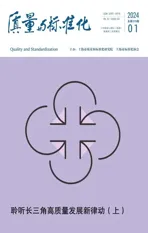立春阳生发 雨水犹凉润
2024-04-27卓鹏伟
文/卓鹏伟

“阳和起蛰,品物皆春”。立春和雨水是春天的开始,立春后一阳初生,草木生发复荣;雨水后降雨渐多,天气回暖还寒。肝属木,应于春,立春、雨水时节使用辛甘生发之类的食药物质有助于舒畅肝气、怡养脾胃、协调五脏。
"Everything comes back to life and spring returns to the earth." Chinese solar terms of "Beginning of Spring" and "Rain Water" show the beginning of spring.Yang-Qi rises and grass grows after the Beginning of Spring while there will be more rain and chilly weather after solar term of Rain Water.The liver belongs with the wood element and corresponds with spring.At this time, some medicinal foods that taste pungent or sweet can help soothe Liver-Qi, nourish the spleen and stomach, and harmonize the five organs.
万物始萌食辛味Pungency foods is the best choice when everything is in bloom
从立春开始到雨水结束的一个月时间里,随着自然界的一阳初生,人体肝气逐渐旺盛,气血上升,形成肝旺阳升的生理特点。“立春雨水到,早起晚睡觉”,这一阶段,促进阳气生发成为人们在生产生活中遵循的原则。
In the solar terms of the Beginning of Spring and Rain Water, as the Yang-Qi rises in nature, the human body's Liver-Qi gradually flourishes, forming the physiological characteristic of liver ascending."When the solar terms of Beginning of Spring and Rain Water arrive, we get up early and sleep late." At this period,the promotion of Yang-Qi has become a principle that people follow in their productive lives.
我国立春的膳食习俗多样,不同时期、不同地域略有差异。例如东汉时期有“食生菜”、晋代有“五辛盘”、唐代有吃春盘,此外,还有吃春饼、春卷,咬春、尝春等,这些习俗所用食物大多具有辛味特性,具有发散作用,可生发肝气,符合春季养肝的思想。
There is a variety of dietary practices during the Beginning of Spring, which varies slightly from one historical dynasty to another and from one region to another.For example, in the Eastern Han Dynasty there was "Mixed greens"; in the Jin Dynasty there was the "Five-pungent vegetables" and in Tang Dynasty there was the "Spring vegetable dishes".In addition, there were also customs including spring cakes, spring rolls, biting the spring, tasting the spring and so on.Most of the food used in these customs had the taste of pungency, which was in line with the idea of nourishing the liver in the spring.
雨水在春节之后,流传的膳食习俗相对较少。例如成都东山客家有“送雨水”,华南地区有“占稻色”,这些习俗虽然表达感恩、祈求丰收等美好愿望,但所用食物以调养脾胃为主,能够达到养脾胃以调肝气的目的。
The Rain Water comes after the Spring Festival.There are relatively few meal customs that are during Rain Water.For example, the Hakka in Dongshan, Chengdu,have the custom of "sending rainwater" while in southern China there are customs of "occupying the color of rice".All the customs are mainly to nourish the spleen and stomach and to express thanksgiving,praying for a good harvest and other good wishes.Although these customs express gratitude, pray for a good harvest and other good wishes, the food used is mainly to nourish the spleen and stomach, which can achieve the purpose of regulating Liver-Qi.
辛甘生发养肝脾Pungent and sweet foods nourishing the liver and spleen
不同节气可用的食药物质,其特性各有不同,立春时节偏重于辛味,雨水则偏重于甘味。
The characteristics of medicinal food differ from one solar term to another, with the pungent favored in Beginning of Spring and the sweet favored in Rain Water.
《黄帝内经》“肝苦急,急食甘以缓之,肝欲散,急食辛以散之”的记载,奠定了中医药物五味调质肝病的理论依据。其医理为,当肝气郁滞时,导致脾胃不畅,可用甘味药物健脾以助肝气条达,以具有发散性质的辛味药物疏散肝郁,促进肝气生发。
Inner Canon of the Yellow Emperorrecorded that"when the liver is bitter and anxious, you'd better eat food of sweet flavor to relieve.When liver needs to be evacuated, it can be evacuated by eating foods of pungent flavor." This establishes the theoretical basis for TCM medications to nourish the liver.Its medical theory is that when Liver-Qi is stagnant, resulting in spleen and stomach disorders, sweet medicines help to regulate Liver-Qi, and dispersing pungent medicines can be used to evacuate liver depression and promote Liver-Qi development.
因此,立春以升补为主,助阳气生发,可选韭菜、萝卜、黄豆芽、葱、香菜(芫荽)、枸杞子等辛味食药物质,制作成虾仁韭菜水饺、韭菜炒虾仁、七宝羮等膳食。雨水时节可选薏米、山药、芹菜、春笋、小米、芋头、莲藕等甘味食药物质,以甘温补脾胃,意在防止肝木之气过剩。
Therefore, during the Beginning of Spring, you can choose leeks, radish, soybean sprouts, green onions,cilantro (coriander), Lycii Fructus and other pungent medicinal food to make shrimp and leek dumplings,stir-fried shrimp with leeks, Soup of Seven Delicacies and other meals.During the Rain Water you can choose barley, Rhizoma Dioscoreae, celery, spring bamboo shoots, millet, taro, lotus root and other sweet medicinal food to nourish spleen and stomach so as to prevent the excessive liver-wood.
结 语Conclusion
“春三月,此谓发陈”。立春、雨水节气选择食药物质的标准密码是“辛甘生发”,选择辛味甘味的食药物质有助于人体舒肝养脾,达到养生目的。值得注意的是,酸味有收敛之性,会影响肝的疏泄功能,杏、山楂、柠檬、乌梅等在立春和雨水之季不宜过多食用。
"Spring means revival and growth." The standard code for choosing medicinal food for these two solar terms is "pungent, sweet and nourishment".Pungent and sweet medicinal food can help the body to soothe the liver and nourish the spleen.Sour flavor has the nature of astringency and will prevent the Liver-Qi from dredging.As a result, during these two solar terms you should not eat too much such as apricot, hawthorn,lemon, plum, etc.
小贴士
七宝羮
Soup of Seven Delicacies
芹菜、芥菜、菠菜各100 g,韭菜、小葱、香菜、蒜苗各50 g,切碎备用。锅中加清水1 000 ml左右,烧开后加入适量植物油,放入芥菜煮1分钟左右,再放入芹菜、菠菜、韭菜煮沸,加入适量淀粉芡后,再放入香葱、蒜苗、香菜煮沸,调入食盐即可。
Prepare and chop 100g each of celery, mustard greens, spinach and 50g each of leeks, spring onions, parsley, garlic cloves.Add and boil water in a pot of about 1 000ml and then add appropriate amount of vegetable oil.Put mustard into the pot and cook for about 1 minute, and then put celery, spinach, leeks to boil.Add the appropriate amount of cornstarch gravy and then put the scallions, garlic cloves, parsley to boil.At last season with salt.
